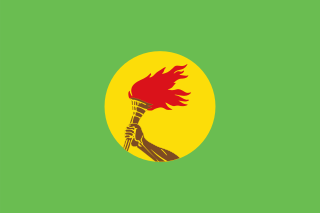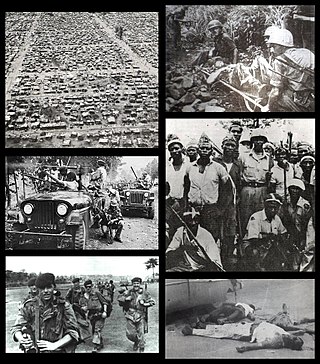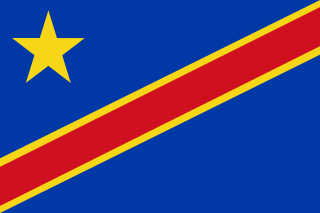
Politics of the Democratic Republic of Congo take place in a framework of a republic in transition from a civil war to a semi-presidential republic.

Zaire, officially the Republic of Zaire, was a Congolese state from 1971 to 1997 in Central Africa that was previously and is now again known as the Democratic Republic of the Congo. Zaire was, by area, the third-largest country in Africa, and the 11th-largest country in the world. With a population of over 23 million inhabitants, Zaire was the most populous officially Francophone country in Africa, as well as one of the most populous in Africa.

Patrice Émery Lumumba was a Congolese politician and independence leader who served as the first prime minister of the Democratic Republic of the Congo from June until September 1960, following the May 1960 election. He was the leader of the Congolese National Movement (MNC) from 1958 until his execution in January 1961. Ideologically an African nationalist and pan-Africanist, he played a significant role in the transformation of the Congo from a colony of Belgium into an independent republic.

Mobutu Sese Seko Kuku Ngbendu Wa Za Banga was a Congolese politician and military officer who was the president of Zaire from 1965 to 1997. He also served as Chairman of the Organisation of African Unity from 1967 to 1968. During the Congo Crisis, Mobutu, serving as Chief of Staff of the Army and supported by Belgium and the United States, deposed the democratically elected government of left-wing nationalist Patrice Lumumba in 1960. Mobutu installed a government that arranged for Lumumba's execution in 1961, and continued to lead the country's armed forces until he took power directly in a second coup in 1965.

Joseph Kasa-Vubu, alternatively Joseph Kasavubu, was a Congolese politician who served as the first President of the Democratic Republic of the Congo from 1960 until 1965.

Moïse Kapenda Tshombe was a Congolese businessman and politician. He served as the president of the secessionist State of Katanga from 1960 to 1963 and as prime minister of the Democratic Republic of the Congo from 1964 to 1965.

The Congo Crisis was a period of political upheaval and conflict between 1960 and 1965 in the Republic of the Congo. The crisis began almost immediately after the Congo became independent from Belgium and ended, unofficially, with the entire country under the rule of Joseph-Désiré Mobutu. Constituting a series of civil wars, the Congo Crisis was also a proxy conflict in the Cold War, in which the Soviet Union and the United States supported opposing factions. Around 100,000 people are believed to have been killed during the crisis.

Étienne Tshisekedi wa Mulumba was a Congolese politician and the leader of the Union for Democracy and Social Progress (UDPS), the main opposing political party in the Democratic Republic of the Congo (DRC). A long-time opposition leader, he served as Prime Minister of the country on three brief occasions: in 1991, 1992–1993, and 1997.

The Popular Movement of the Revolution was the ruling political party in Zaire. For most of its existence, it was the only legally permitted party in the country. It was founded by Joseph-Désiré Mobutu on 20 May 1967.

Antoine Gizenga was a Congolese (DRC) politician who was the Prime Minister of the Democratic Republic of the Congo from 30 December 2006 to 10 October 2008. He was the Secretary-General of the Unified Lumumbist Party.

Évariste Leon Kimba Mutombo was a Congolese journalist and politician who served as Foreign Minister of the State of Katanga from 1960 to 1963 and Prime Minister of the Democratic Republic of the Congo from 13 October to 25 November 1965. Kimba was born in 1926 in Katanga Province, Belgian Congo. Following the completion of his studies he worked as a journalist and became editor-in-chief of the Essor du Congo. In 1958 he and a group of Katangese concerned about domination of their province by people from the neighbouring Kasaï region founded the Confédération des associations tribales du Katanga (CONAKAT), a regionalist political party. In 1960 the Congo became independent and shortly thereafter Moise Tshombe declared the secession of the State of Katanga. Kimba played an active role in the separatist state's government as its Minister of Foreign Affairs and participated in numerous talks with the central government aimed at political reconciliation. Following the collapse of the secession in early 1963, Kimba had a falling out with Tshombe and took up several ministerial posts in the new province of South Katanga.

The Republic of the Congo was a sovereign state in Central Africa, created with the independence of the Belgian Congo in 1960. From 1960 to 1966, the country was also known as Congo-Léopoldville to distinguish it from its northwestern neighbor, which is also called the Republic of the Congo, alternatively known as "Congo-Brazzaville". In 1964, the state's official name was changed to the Democratic Republic of the Congo, but the two countries continued to be distinguished by their capitals; with the renaming of Léopoldville as Kinshasa in 1966, it became also known as Congo-Kinshasa. After Joseph Désiré Mobutu, commander-in-chief of the national army, seized control of the government, the Democratic Republic of the Congo became the Republic of Zaire in 1971. It would again become the Democratic Republic of the Congo in 1997. The period between 1960 and 1964 is referred to as the First Congolese Republic.

General elections were held in Zambia on 5 December 1973. They were the first elections held since the country was formally declared a one-party state in August, with the United National Independence Party (UNIP) as the only legally permitted party. UNIP leader Kenneth Kaunda was automatically elected to a third five-year term as President, and was confirmed in office via a referendum in which 88.8% of voters approved his candidacy. UNIP also won all 125 seats in the National Assembly. Voter turnout was 39% of the 1,746,107 registered voters for the presidential election, and 33% for the National Assembly election.

A constitutional referendum was held in the Republic of the Congo (Léopoldville) between 25 June and 10 July 1964. The new constitution, known as the "Luluabourg Constitution", changed the country's system of government, its name, and the number of provinces. It was approved by 91% of voters.

General elections were held in the Democratic Republic of the Congo between 18 March and 30 April 1965, following the promulgation of a new constitution approved by a referendum the previous year. 223 political parties contested the election for 167 seats in the Chamber of Deputies.

Parliamentary elections were held in the Democratic Republic of the Congo on 15 November 1970. They were the first parliamentary elections held since Joseph Mobutu seized power in a coup five years earlier.

Presidential elections were held in Zaire on 3 December 1977. They were the first held after a new constitution was promulgated in 1974.

Presidential elections were held in Zaire on 29 July 1984. At the time, the country was a one-party state with the Popular Movement of the Revolution as the only legal party. Its leader, incumbent president Mobutu Sese Seko, was the only candidate, with voters asked to vote "yes" or "no" to his candidacy. The results showed 99.16% of voters casting a "yes" vote.
On 5 September 1960 President Joseph Kasa-Vubu of the Democratic Republic of the Congo dismissed Prime Minister Patrice Lumumba from office. He also dismissed six other members of his government: Deputy Prime Minister Antoine Gizenga, Minister of Justice Rémy Mwamba, Minister of Interior Christophe Gbenye, Minister of Information Anicet Kashamura, Secretary of State Antoine-Roger Bolamba, and Secretary of State Jacques Lumbala.
During the presidency of President Mobutu Sese Seko of the Democratic Republic of the Congo, later Republic of Zaire (1965-1997), social and political rights were strongly curtailed. As a consequence, several Congolese/Zairean citizens went into exile for political reasons.
















